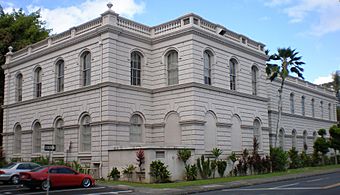Kapuāiwa Building facts for kids
Quick facts for kids |
|
|
Kapuāiwa Building
|
|
|
U.S. Historic district
Contributing property |
|

Oblique view from Queen St.
|
|
| Location | 426 Queen St., Honolulu, Hawaii |
|---|---|
| Area | 0.5 acres (0.20 ha) |
| Built | 1884 |
| Architect | George Lucas |
| Architectural style | Italianate Renaissance revival |
| Part of | Hawaii Capital Historic District (ID78001020) |
| NRHP reference No. | 73000660 |
| Added to NRHP | July 2, 1973 |
The Kapuāiwa Building is a historic building located at 426 Queen Street in Honolulu, Hawaii. It is part of the Hawaii Capital Historic District. This building was constructed in 1884, during the time of King Kalākaua. Its main purpose was to safely store important government documents, protecting them from fire.
The building was named after Lot Kapuāiwa, who was also known as King Kamehameha V. Its architect, George Lucas, designed it in a style called Italianate Renaissance revival. This style was popular and matched other buildings from the Hawaiian Kingdom era. The Kapuāiwa Building was officially added to the National Register of Historic Places on July 2, 1973, recognizing its historical importance.
The Kapuāiwa Building: A Historic Hawaiian Landmark
What Does the Building Look Like?
The Kapuāiwa Building is made from special concrete blocks that look like rough stone, a style called rustication. It has two floors and a flat roof. The main entrance is set back from Queen Street, making it easy to spot.
The windows on the ground floor have rounded tops with a special stone in the middle called a keystone. On the upper floor, the windows have decorative "dripstones" above them. The very top of the building's roofline is decorated with a cornice (a decorative molding) and a balustrade (a fancy railing).
Changes Over Time
In 1930, the Kapuāiwa Building got some updates. A new section was added, along with a new hallway for entering the building. The inside of the building was also redone at that time. Today, the interior is still being updated to keep this important piece of history in good shape.


